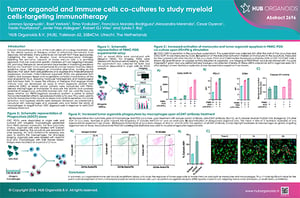PRESENTED AT AACR 2024
Tumor organoid and immune cells co-cultures to study myeloid cells-targeting immunotherapy

Cancer immunotherapy is one of the main pillars of oncology treatment, due to the clinical success of therapies aimed at enhancing anti-tumoral T-cell responses. Nonetheless, many patients do not benefit from these approaches, highlighting the need to develop novel immunomodulatory strategies. Exploiting the anti-tumor capacity of innate immune cells is a promising approach that can overcome specific limitations of T cell-targeting therapies. Still, promising therapeutic developments face hurdles in translating preclinical findings into treatment since conventional 2D cancer models hold low clinical predictive value. HUB developed an innovative alternative, building on the discovery that adult stem cells proliferate and organize into three-dimensional organotypic structures. Patient-derived organoids (PDO) are generated from healthy and diseased tissues and recapitulate complex characteristics of the original parental tissue, including molecular heterogeneity and morphological and functional traits. To assess the efficacy of therapies that engage innate immune cells, we developed an assay in which organoids derived from colorectal (CRC) or breast cancer patients were co-cultured with PBMC-derived macrophages or monocytes to evaluate the activity and cytotoxic potential of exogenously activated myeloid cells.
Download this poster to discover:
- The establishment of organoid-based co-culture platform with PBMC-derived macrophages or monocytes
- The development of the ADCP phagocytosis assay to evaluate the cytotoxic potential of exogenously activated myeloid cells
- The data demonstrating the activation of monocytes and tumor organoid phagocytosis in a CRC or breast PDOs co-cultured with PBMC-derived monocytes
